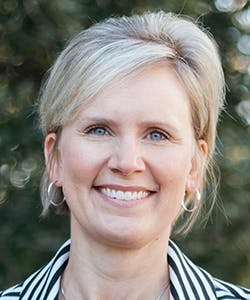Podcast: When did soft skills in industry become hard skills?
You know the stereotype of frontline industrial workers when it comes to soft skills: they're poor communicators with great ideas and a lot of rough edges. But how true is that stereotype really, in an age where good soft skills are required for the average plant worker to succeed on the job? And for managers who do want to polish their skills, what methods are proven to work? Join Lisa Brownlee, the owner and founder at Leader’s Imago, for a conversation on these topics and more.
Below is an excerpt from the podcast:
PS: Hi everyone and welcome to a new episode of Great Question! A Manufacturing Podcast brought to you by Endeavor Business Media's manufacturing group. I'm Tom Wilk, the chief editor of plant services and with us today is Lisa Brownlee, who is the owner and founder at Leader’s Imago, which focuses on transformation, growth, development, and improvement, whether for an individual or an organization. And the great question that we're going to tackle today is: when exactly did soft skills become hard skills, especially for the average industrial worker?
Let's say a few things about Lisa before we start the conversation, she holds both BS and MS degrees in chemical engineering. She worked for 11 years for a major engineering and manufacturing company in Columbia, SC, and is also a Lean 6-Sigma Master Black Belt. Her experience spans operations, continuous improvement, training development and delivery, and product assurance.
Lisa and I met earlier this March at MARCON 2024 on a panel to support the Unturning Steel program. That's a program that supports veterans as they transition from active service into the private sector. She also gave a session presentation at the conference on soft skills and hard skills. I'm so pleased, Lisa, that you were able to join us today to talk more about that topic.
LB: It is my pleasure to be here, Tom.
PS: After that long introduction, tell us more about yourself, how you got into this specific line of business, maybe some things you're working on right now.
LB: Yeah, what a long, strange trip it has been! When I tell people I'm a chemical engineer turned leadership development consultant, they're like, how's that go? I grew up in manufacturing and had a great experience as a process engineer. I loved working on the shop floor and learned so much from the operators. They took good care of me, and it was a great place to learn, a good proving ground.
The company I worked for I was really fortunate to have a company that invested so much in my growth. You described a lot of different experiences that I had over the years in manufacturing for this company. My last job as a product assurance manager, I had a very large team, about 80 people under my umbrella, 24/7 operations – a lot of crisis management. I admire the people who are good at crisis management because that is not my bag. And I started asking myself, what do I really want to be when I grow up? And I thought back to, where am I passionate? What am I good at? What do I enjoy?
It was really back to the improvement and the training and coaching that I did during one portion of my career. And I thought, “I think I've got something to offer here.” So in 2013, Leader’s Imago was born, with the goal of helping leaders transform, emerge, and spread their wings.
I had some really great mentorship as I got started, and acquired the Team Manager Development Center, which we'll be talking about at some point in this conversation, I'm sure. I've just built my business from there, and I have some longtime clients that I've gotten to work with for many years on leadership development, helping them identify what competencies make sense for their culture, and building training and delivering that around what that model looks like for them. I've also got a couple of more process improvement type projects that are tapping into my Lean 6 Sigma skills and change management skills, trying to keep those sharp.
PS: You know, Lisa, what strikes me about your experience is that the wide range of experiences you were able to develop on the job has led you to a career where you help enable that growth in others, that you give them the confidence to try different things on the manufacturing floor. Tell us about the industry and the people that you work with. Are people like their stereotypes that we hear in manufacturing, sort of rough edges and all?
LB: That's a funny question, and the answer is yes and no. I find that we are all a product of our cultures and what is modeled for us, rough edges and all. I think “rough edges and all” doesn't necessarily apply just to the manufacturing industry. I've seen some rough edges in all walks of life!
The “no” part is that there's more to us than meets the eye. I mean, we all have biases because we are human beings, and I find myself challenged by people who surprise me, and I love that. It prompts me to give people a bigger benefit of the doubt and to say, you know what? We are each more capable than what we are revealing to others, and if only I as the individual can become aware of that, that my impact is not having the effect that I intended, or if somebody else can hold the mirror up to me, and be able to express that in a way that I can hear it, then we've cracked open the door for someone to struggle through their cocoon moment of the imago process in order to emerge having new skills, having a new attitude, having new understanding, new self-awareness.
I think that is what is exciting about being in the manufacturing industry, in particular. Manufacturing has traditionally been this “command and control” approach, top-down. And I think that in the last couple of decades, all the research on employee engagement that has come out to say, we need to have empowered employees who will own their work as if they owned the business. If that's what we're really after, we need a different leadership and management approach. And trying to create a space for especially frontline supervisors who do what was modeled for them in a lot of cases. To give them kind of that mirror and say, alright, what do you see, what's working, what's not working here? Here are some other ways to try it. What's going to fit for you, so that you can still be your authentic self.
PS: I think it's interesting that we see a newer generation of leaders also moving into manufacturing. Both at the MARCON conference and at this week's Fluke Xcelerate conference, I observed a lot more Millennial leadership on the maintenance plant floor than I had before. And with these new leaders is going to come new backgrounds, which inform how they approach people. These new leaders are coming on board, and they're a little bit less beholden to the old ways of doing things simply because they have different expectations on how their careers are going to go. One stat that I thought was fascinating was that, you know, the average Gen X worker or Boomer worker changes jobs three times in 40 years, and the average Millennial worker will change jobs 11 times in eight years. The expectation for themselves is to keep learning and growing and moving, and so that will of course have a different impact on how they manage their teams.
LB: Definitely. Traditionally frontline supervisors are the people who performed really well in their do-er role, like whether they were an operator, or they're a welder or an electrician. Somebody said, “hey, that guy's doing so good. I'm going to make him the manager of the rest of the people” whether they had leadership skills or not. And, I find that our frontline supervisors are also the ones who might not get the good training opportunities to develop their leadership and management skills. Nor do they get the high quality feedback and coaching that helps them recalibrate or reshape. So it's sort of like, they've ever either got it or they don't.
To your point, we've got all these newer generations coming into the workforce. What an exciting time to be in my shoes and see how does their experience and technology lend itself to what I'm trying to do! One of the things that I think we're going to have to keep an eye on is the soft skills. These are the interpersonal skills which frankly are the hard ones to do.
When I'm hammering a nail or welding something, I'm getting immediate feedback about my results. Whereas when I'm talking to you, I know what I'm intending, but I may not see the results of that immediately, or I may have ticked you off because of the way I came across and I might not know that you're stewing over that. The soft skills – communication, delegation, priority setting – they don't always unfold the outcomes quickly, and they really are hard skills.
PS: It can take a lot of experience just to read someone else like you're talking about, where as you said, the immediate feedback when you measure the health of a machine or even pound a nail, and do get immediate mechanical feedback. The social feedback loop is a lot more difficult for people and yeah, I think we've all seen people who struggle in these kind of situations. That's part of why I was excited to speak with you today, it’s because you have an approach and a system to help other people understand, what is the level of skill they've got at reading a social situation? How do their on-the-job decision making processes impact their success or failure on the job? And that goes back to the Team Manager Development Center in large part, correct?
LB: Yes, yes, my baby. My mentor, Ellen Clausen Davis, had her consulting business, a very successful business, EC Davis and Associates. She is the brilliant mind who envisioned the Team Manager Development Center, and what prompted her was her realization that those frontline supervisors, mid-level managers, are the ones who are often thrown into the deep end of the pool, sink or swim. And she said, how can we create a space where a supervisor, a team manager could come show what they know how to do, get really high quality feedback and coaching, have a chance to self-reflect, and marry all of that together, giving them an opportunity to practice things in some different ways, all of which giving them a chance to stretch outside of their comfort zone and practice things in a new way and see how that changes the outcome.
So she and her team did a huge deep dive, assessing what does this level of management do on a day-to-day basis? What makes them most successful? What are those competencies that that they need to be able to master? And what sort of simulation could we build that would feel like real life, and give them a chance to practice this, in a real life manufacturing kind of setting? And the Team Manager Development Center was born.
Read the rest of the transcript
About the Podcast
Great Question: A Manufacturing Podcast offers news and information for the people who make, store and move things and those who manage and maintain the facilities where that work gets done. Manufacturers from chemical producers to automakers to machine shops can listen for critical insights into the technologies, economic conditions and best practices that can influence how to best run facilities to reach operational excellence.
Listen to another episode and subscribe on your favorite podcast app
About the Author

Thomas Wilk
editor in chief
Thomas Wilk joined Plant Services as editor in chief in 2014. Previously, Wilk was content strategist / mobile media manager at Panduit. Prior to Panduit, Tom was lead editor for Battelle Memorial Institute's Environmental Restoration team, and taught business and technical writing at Ohio State University for eight years. Tom holds a BA from the University of Illinois and an MA from Ohio State University





